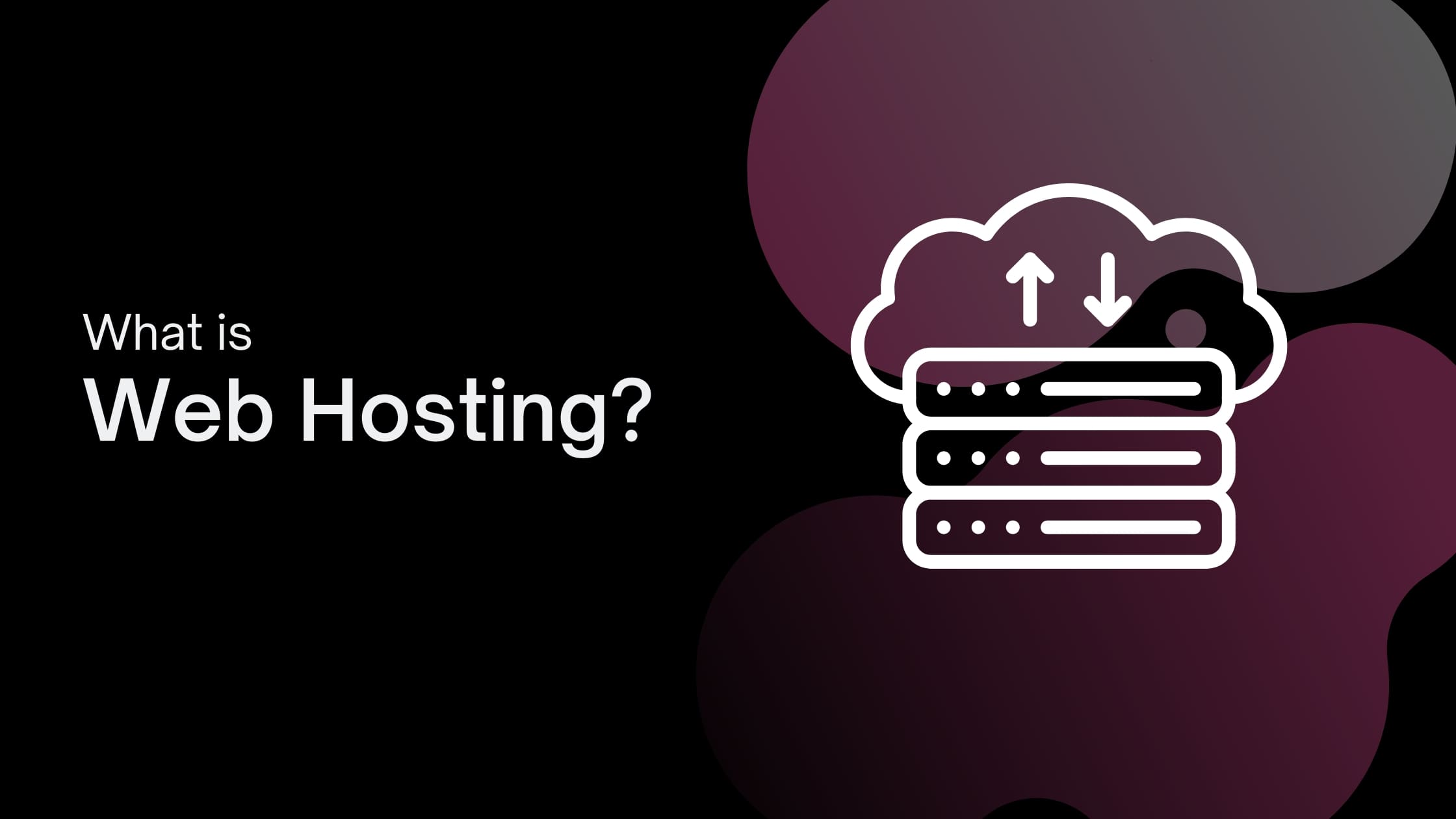Have you ever wondered how your favorite websites appear on your screen with just a single click? It might seem like magic, but there’s a fascinating world behind that instant connection — web hosting.
So what exactly is web hosting? In simple words, it’s the foundation of a website that keeps it up and running. You can think of it as the invisible backbone of the internet, making it possible for websites to be accessible to anyone, anywhere, at any time.
But why is it so crucial? Whether you’re thinking of starting a blog, an online store, or just a personal brand, getting website hosting is one of the first steps to creating a successful online presence.
It’s what gives your site a sturdy place to live, thrive, and always be ready for visitors. So, let’s uncover everything you need to know about web hosting that will set your site up for success!

What Is Web Hosting?
Web hosting might sound technical, but it’s actually quite straightforward. In the simplest terms, web hosting is like renting a plot of digital land where your website lives.
Imagine you’re a chef wanting to open a new restaurant. You’ve got the recipes, the ambiance, and the enthusiasm to serve finger-licking dishes to the world. But where do you set up shop?
You need a physical space where people can come, sit, and enjoy your culinary creations. Web hosting works much the same way but in the digital realm.
When you create a website, it’s just like opening your restaurant or a store. But instead of kitchen appliances and comfy chairs, you’re dealing with various files—images, text, videos, and code.
All these files need to be stored somewhere that’s accessible to anyone on the internet, and that’s where web hosting comes in. It’s a service that provides the space and technology to store your website’s files on a server.
This way, when someone types your website’s address into their browser, they can find and view your site.
How Web Hosting Works
Web hosting works by providing you with a rental space on a web server. The server acts like a building where your business (your website) is housed.
When people want to visit your site, they navigate to your address on the internet, and voila, they see your site just like they’d walk into your office.
To put it another way, imagine your website is a book. Web hosting is the library that holds your book. When someone wants to read your book, they go to the library, ask for it, and the library provides them with the book to read.
The server (your library) is always online and ready to serve your website to visitors anytime they come knocking.

Difference Between Web Hosting and Domain Name
You might have heard the term ‘domain name‘ every time you searched how to create a website. It’s easy to mix it up with web hosting, but they play very different roles.
If we stick with our previous analogy, while web hosting is the library that stores your book, the domain is the name and address of the library. It’s how people find where your book is stored.
Without a domain name, visitors wouldn’t know where to look for your website. In a nutshell, hosting is the physical space where your website lives, and the domain name is the signpost that directs people to it.
You need both to work together for a functioning website. The domain tells people where to go, and the web host ensures your site is there, ready and waiting when they arrive.
Types of Web Hosting
Choosing the right hosting type is like picking the perfect location and setup for your restaurant to get the most out of it. The type of hosting you select determines your website’s performance, security, and reliability.
Let’s take a close look at the different types of web hosting, breaking down what each offers and how they stack up against each other.
Shared Hosting
Shared hosting is like living in a big apartment complex. You and your neighbors all share the same building’s resources, like the pool, gym, parking lot, or maybe a water tank. It’s affordable and comes with a community vibe but has its downsides.
Similarly, in shared hosting, your website resides on a server along with many other websites. You share resources like CPU, RAM, and bandwidth with these sites.
This setup is managed by your hosting provider, so you don’t have to worry about technical details.
- Pros: Cost-effective, easy to manage, and perfect for small websites or blogs.
- Cons: Limited resources, less control, and possible slowdowns if other sites on the server get too busy.
VPS Hosting (Virtual Private Server)
Think of VPS hosting as owning a condo in a large building. While you still share the building, you have your own dedicated space that you can customize to your liking.
VPS hosting gives you a dedicated portion of a server’s resources that are yours alone. This means more control, better performance, and the ability to install custom software.
- Pros: Greater control, enhanced performance, and scalable resources. You get the flexibility to upgrade your space without moving out.
- Cons: It’s pricier than shared hosting and requires a bit more technical know-how to manage effectively. If you’re not tech-savvy, you might need to invest some time in learning the ropes or hire someone who is.

Dedicated Hosting
Dedicated hosting is the equivalent of owning a standalone house. You have the entire property to yourself, giving you complete control, privacy, and maximum resources.
Fancy living in a spacious home where you don’t have to share your amenities with anyone else? Dedicated hosting offers similar perks.
You get an entire server that’s exclusively yours, dedicated to a single website. This offers the highest level of customization.
- Pros: Full control over server settings, unparalleled performance, and reliability. This is the go-to choice for large businesses with specific security needs or high-traffic websites.
- Cons: It’s the most expensive option and requires significant technical expertise to manage. If something goes wrong, you’re the one who needs to fix it (unless you opt for managed services).
Cloud Hosting
Cloud hosting is like living in a futuristic, flexible apartment complex that can expand or shrink as needed. Your website isn’t tied to one physical server but uses a network of connected servers.
It can adjust the resources based on your website’s fluctuating demands and handle your needs efficiently. It’s akin to having your book in multiple branches of a library across the city, all interconnected. If one branch gets too busy, the others can help out.
- Pros: Highly scalable, reliable, and flexible. It’s great for websites with varying traffic levels. It handles traffic spikes effortlessly and ensures you don’t pay for resources when you don’t need them.
- Cons: Can be more complex to manage than traditional hosting, and costs can add up if you need a lot of resources consistently.
Managed Hosting
Managed hosting is similar to hiring a team of professional chefs and managers to run your restaurant. They handle all the grind, allowing you to focus on creating the best meal experience for your customers.
With managed hosting, your hosting provider handles server management, updates, backups, security, and much more. It’s perfect for those who prefer a hands-off approach.
However, since you’re relying on your provider for everything, make sure to choose a reputable one.
- Pros: Stress-free management, excellent support, and enhanced security features. It’s ideal for small businesses that want to ensure their site runs smoothly without the hassle of server maintenance.
- Cons: It’s slightly more expensive than unmanaged hosting, and you have less control over server settings. Nevertheless, it’s worth it if you’re looking for peace of mind and expertise.
Key Features to Look For in a Hosting Service
When building your dream home, you wouldn’t want a shaky foundation, limited space, or unresponsive builders, right? Well, building your website follows a similar principle.
Here’s what you need to be on the lookout for when selecting a hosting service for your website:
1. Uptime and Reliability
Your website is your brand’s 24/7 online storefront. You need its ‘doors’ to be open all the time. Imagine you’ve just launched a big campaign, and suddenly, your website goes down. Total disaster, right?
Server uptime ensures your site is accessible whenever visitors drop by, whether it’s noon or midnight. You want a hosting service that promises stellar uptime, ideally 99.9% or higher.
This means less than an hour of downtime per year, so your site is always ready to welcome users, no matter the time of day.
2. Storage and Bandwidth
Picture your website as a buffet restaurant. Storage is your buffet counter space—every dish, or in this case, every file and image on your site, needs a place to live.
Bandwidth, on the other hand, is like the number of guests who can stroll through your buffet aisle at the same time without feeling cramped.
If your aisle (bandwidth) is too small or crowded, people will leave frustrated. Also, if your counter (storage) runs out of space for food (data), people will end up with unsatisfied hunger.
Ensure your hosting plan offers ample storage and bandwidth to keep things running smoothly, even during peak times.

3. Speed and Performance
Remember the frustration of waiting for a slow elevator? A laggy website feels the same to your visitors. We live in an age of instant gratification. If your website takes more than a few seconds to load, visitors might just hit the back button and go elsewhere.
Your hosting service plays a huge role in how fast your website loads. It should provide high-speed servers and robust infrastructure to ensure quick load times.
A smooth and speedy website keeps visitors happy and can even boost your SERP (Search Engine Results Page) rankings.
4. Customer Support
Let’s say it’s late at night, you’re tweaking your website, and suddenly, something goes wrong—your site crashes right before a big sale. You need help, and you need it fast, but who do you call?
This is where reliable customer support comes in handy. A good hosting service offers 24/7 customer support, ready to rescue you from any tech emergencies. Look for providers known for their quick and effective support through chat, phone, and email.
Knowing there’s a friendly expert on the other end can be a huge relief when you’re in a bind.
5. Security
The world is full of cyber threats today; hence, website security is non-negotiable. Essential security features like SSL certificates (which encrypt data sent to and from your site), firewalls, and regular backups should be part of your hosting package.
They act as your site’s bodyguards, protecting sensitive data from potential breaches. A secure website not only guards your data but also instills trust in your visitors, showing them that their information is safe with you.
6. Control Panel Options
You don’t want to deal with a complicated maze every time you want to make a change in your house, and the same goes for a website.
Whether you’re a tech newbie or a seasoned pro, a user-friendly control panel can make managing your hosting account a breeze.
Look for options like cPanel or Plesk that offer intuitive interfaces to simplify tasks like setting up email accounts, managing databases, and installing applications. It’s like having a straightforward dashboard for stress-free website operations.
7. Scalability
Your website might start small, but what if it suddenly takes off? Think about how your needs evolve over time.
Just as you might add more tables to the dining hall when your restaurant grows, your website needs to expand as it attracts more visitors and hosts more content. So, you want a hosting provider that can grow with you.
Hosts that offer scalable options allow you to upgrade resources seamlessly as you reach new heights. This flexibility ensures your website can handle increased traffic without any hiccups, keeping your operations smooth and your audience satisfied.
Why Good Hosting Matters for Your Website?
When it comes to your website, hosting isn’t just about finding a place to park your domain. It’s the base of your site’s performance, security, and overall success.
Let’s chat about why investing in quality hosting can make all the difference for your site’s health and growth.
Impact on Website Performance
We all know how annoying it can be to visit a website that takes forever to load. Quality hosting provides the speed and uptime your site needs to perform like a well-oiled machine, even during traffic surges.
Visitors expect your website to load in the blink of an eye; if it doesn’t, they’ll probably leave and move on to a competitor’s site in search of a faster one. The result? A high bounce rate!
So fast load times aren’t just a side dish; they’re the main course. If your site is slow, you risk losing potential customers before they even see what you have to offer.
Importance for SEO
If you want your site to show up at the top of Google search results, you need good hosting. Why? Because search engines are like food critics for your restaurants. They evaluate every detail before deciding whether to recommend you to others.
Fast-loading, consistently available websites are ranked higher by search engines. If your website is sluggish or frequently down, search engines will push it down in the rankings, lowering the chances of people finding you.
With good hosting, your site’s responsiveness and reliability improve, which can significantly boost your search engine optimization (SEO).
Role in Website Security
Just as you’d install robust locks and CCTV cameras in your restaurant to protect it from break-ins, your website needs protection too. A good hosting provider offers strong security measures to keep it safe from cyberattacks, malware, and data breaches.
Imagine the horror of finding your restaurant cashier, and customers got robbed one night. The same feeling applies if your website gets hacked and your personal and user data is compromised.
When your site is secured by quality hosting, you can focus on running your business without constantly worrying about cyber threats.
User Experience Considerations
Think about the experience your customers have in your restaurant. Comfortable seating, friendly staff, and a pleasant atmosphere make them feel valued and eager to return.
Similarly, when people visit your site, they want a smooth, hassle-free overall experience. Good hosting does this for your website. It ensures your visitors enjoy their time, feel welcomed, and rest assured that they’ll have a great experience every visit.
This reliability builds trust and credibility with your audience. When users see that your site is consistently up, their data is secure, and they aren’t kept waiting, they are more likely to stick around and come back.
How to Choose the Right Web Hosting for Your Needs?
Selecting the right web hosting provider for your website can feel like choosing the perfect builder for your dream home. Don’t worry; we are here to make your decision easier and ensure you get the best bang for your buck.
Here’s how to make sure your online ‘home’ fits just right:
1. Assess Your Website’s Size and Traffic
First things first, take a good look at your website. Is it a small personal blog, or are you running a big online store with tons of daily visitors? The size and traffic of your site are key factors in determining the type of hosting you need.
Just like you wouldn’t choose a one-bedroom apartment for a family of five, you wouldn’t want a basic hosting plan for a high-traffic website. For smaller sites with moderate traffic, shared hosting might be just fine.
But if you’re dealing with higher traffic or more complex functionalities, you might want to look into dedicated or managed hosting. This way, you’ll have the resources you need without the risk of technical breakdowns.
2. Consider Your Budget
Web hosting costs can range from just a few bucks a year to hundreds, depending on what you need. You can find options that are both cost-effective and high-quality if you know where to look.
But just like you wouldn’t splurge on gourmet groceries for everyday meals, you don’t need to shell out on hosting unless it truly adds value to your site. The trick is to find a sweet spot where you’re not overspending but also not skimping on essential features.
Think about what features are absolutely crucial for your site and what you can afford. Sometimes, paying a bit more upfront can save you from headaches down the road.
3. Understand Technical Requirements
Now, this part might sound a bit geeky, but it’s super important. What kind of technical support does your site need?
For instance, if you’re using a specific content management system (CMS) like WordPress, make sure your hosting provider supports it. Look for features like one-click installations, SSL certificates, and automatic backups.
Plus, if you’re a tech novice who needs 24/7 support, opt for hosts who guarantee excellent customer service. These can make a world of difference in how well your site runs.
4. Compare Different Hosting Options
With so many hosting providers out there, it’s easy to get lost in the options. Don’t rush—take your time to read reviews, ask for recommendations, and compare features.
Look for insights into uptime reliability (you want your site to be up at least 99.9% of the time), customer support (you’ll want friendly, knowledgeable help when you need it), and great overall performance. It might take a bit of research, but it’s worth it.
(Speaking of great options, have you checked out ShiftWeb’s web hosting yet? Our managed services take a lot of the hassle out of the equation, so you can focus on what you do best.)

How to Set Up Your Web Hosting?
Setting up web hosting is easier when you’re equipped with proper know-how and guidance. Here’s a simple step-by-step guide to get you started:
Step 1. Register a Domain
Before anything else, you need a domain name. It’s your website’s address on the internet that people will type into their browsers to find you. Choosing a good domain name is the key because it’s the first impression people will have of your site.
We highly recommend using GoDaddy for this. They make the process super straightforward, and you’ll have your domain registered in no time. Just head over to their site, pick a unique and memorable domain name, and you’re good to go!
If you feel stuck or unsure somewhere in the process, check out this guide on how to register your domain name.
Step 2. Purchase a Hosting Plan
Now that you have your domain, you need a place to store all your website’s files. This involves buying a hosting plan.
There are different types of hosting available. Look at your options, compare features and prices, and select the type that best fits your needs and budget. Don’t forget the pros and cons of each type we discussed earlier.
Once you’ve selected the hosting type, the next step is to pick a reputable provider to purchase your web hosting, and you’re almost there. This step is crucial because your hosting provider will affect your site’s performance and reliability.
Step 3. Setup and Configure
Now comes the important part — making it all work. With your domain and hosting plan ready, it’s time to set everything up. This might sound complicated, but don’t fret; I’ll walk you through it.
First, you’ll need to configure your DNS settings. This is basically telling the internet where to find your website. After that, you can start uploading your website files.
If you need a content management system (CMS), many hosting providers offer one-click installations to make this process even easier.
You’ll also be introduced to control panels like cPanel, which might look intimidating at first, but they’re designed to be user-friendly. Control panels allow you to easily handle different aspects of your hosting, like creating email accounts, managing databases, and setting up backups.
Now, typically you’d have to purchase a hosting plan and build your website separately. But with us, you can skip the inconvenience. Just choose a template, and we’ll handle everything for you, including setting up your hosting.
Sign up with us today.
4 Common Web Hosting Myths Debunked
When it comes to web hosting, there’s no shortage of misinformation floating around. These myths can lead you down the wrong path, leaving you with a slow, unreliable website.
Let’s clear the fog and debunk some of the most common web hosting misconceptions.
Myth 1: All Web Hosting is the Same
Many people think that web hosting is a one-size-fits-all kind of deal, but this couldn’t be further from the truth. Web hosting varies greatly depending on the type and provider.
Shared hosting, VPS, dedicated servers, and cloud hosting each offer different levels of performance, security, and control.
For instance, while shared hosting is affordable and great for beginners, a dedicated server provides top-tier performance and customization for high-traffic sites. The choice depends on your specific needs and goals.
Myth 2: Cheaper is Better
We all love a good bargain, and it might be tempting to go for the lowest-priced hosting option, but this can backfire. When it comes to web hosting, you really do get what you pay for.
Extremely cheap hosting services might save you some money upfront, but they can come with limitations like slow speeds, frequent downtime, and poor customer support.
Investing a bit more can ensure better performance, security, and reliability, which is crucial for maintaining a professional online presence.
Myth 3: Good Hosting Only Affects Large Websites
This is a big misconception. It’s easy to think that only large, high-traffic websites need good hosting, but small and moderate websites can benefit just as much.
Take a local bakery’s website, for example. If they suddenly get featured in a popular food blog, a surge in traffic could crash a poorly hosted site.
But with good hosting, the site can handle the increased visitors smoothly, ensuring that new customers get a great first impression.
Myth 4: You Don’t Need Customer Support if You’re Tech-Savvy
This is far from reality. Even the best pilots need a ground crew, and even the most tech-whizz individuals can require expert help. Issues can arise that you might not be able to handle on your own, from server crashes to security breaches.
Whether you’re troubleshooting a complex issue or just need advice on optimizing your server settings, quality customer support is invaluable. It can help you navigate these problems quickly and efficiently.
It’s like having a life jacket – you might not need it often, but when you do, it’s crucial.

Get Started Today
Now that you know the ins and outs of web hosting, it’s time to take the next step! The correct web hosting service is crucial for your website’s success, so take your time and find a hosting provider that fits your needs perfectly.
ShiftWeb understands how important this decision is, and we’re here to help. We prioritize offering top-notch web hosting services and building quality websites for our clients.
If you have any questions, need personalized advice, or want support in choosing from our web design templates, don’t hesitate to contact us. Let us help you create a website that stands out, and watch your online presence grow with confidence!




